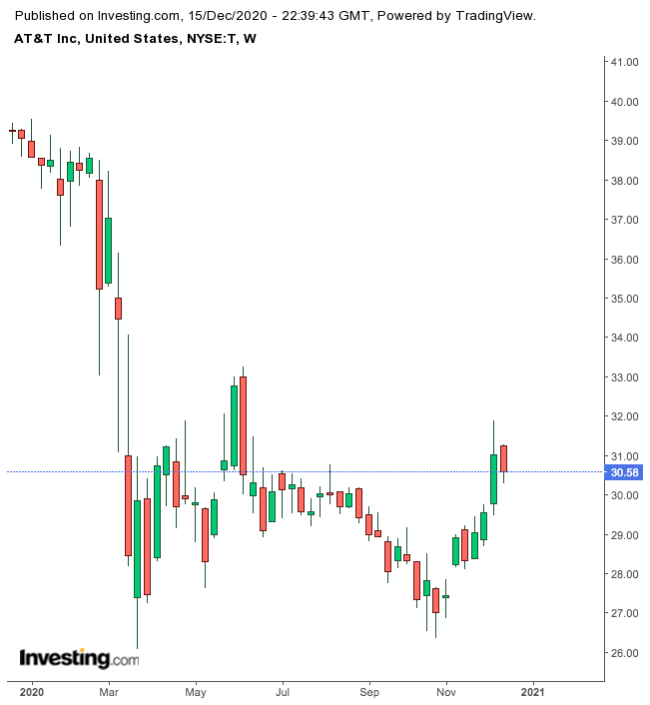America’s largest telecom operator, AT&T (NYSE:T), is keeping its investors guessing about its future. Following the Dallas, Texas-based company's massive debt-loaded acquisition strategy of the past decade, the company is struggling to find its place in the post-pandemic world where it’s facing a variety of competitive threats.
AT&T’s wireless business dropped to No. 3 this year, following T-Mobile’s (NASDAQ:TMUS) acquisition of Sprint Corp. The company had just launched HBO Max, its bid to compete in a world that is rapidly moving to the streaming video model, but that battleground has become more competitive after the huge success}} of Walt Disney Company's (NYSE:DIS) streaming offerings.
While the competition in both the wireless and entertainment segments heats up, AT&T is left with a huge load of debt along with assets that are losing their value. The Wall Street Journal reported last week that the telecom and media giant got bids for its DirecTV unit, valuing the satellite-TV service at more than $15 billion including debt. Compare that to AT&T's purchase of DirecTV in 2015 for about $49 billion, or $66 billion including debt.
These problems, both structural and cyclical, are punishing those who bought AT&T stock. Its shares have massively underperformed during the past five years, losing 15% just during the past 12 months.

For investors who like the company’s rich 7% dividend yield, it’s tough to decide whether this is the right time to buy this stock, especially when its businesses are under pressure and the future is uncertain.
Some Signs of Turnaround
This year, AT&T saw its revenue shrink as the pandemic hurt sales both in its wireless and ad business departments. Sales fell 9% and 5% in Q2 and Q3 2020, respectively, as the company’s Warner Media suffered due to an absence of theatrical releases and lower revenues from games and other income streams.
Despite this bleak picture, there are some signs that the company’s turnaround efforts are gaining pace as part of an agreement between the company and an activist investor, Elliott Management Corp., a hedge fund with a $3.2-billion stake in the company.
The company’s efforts to get rid of its loss-making DirecTV unit are part of the restructuring plan being pushed by Elliott. The pay-TV business has lost millions of subscribers in recent years as viewers switch to on-demand entertainment services like Netflix (NASDAQ:NFLX). AT&T’s pay-TV losses have far outpaced declines at rivals like Comcast (NASDAQ:CMCSA) and Dish Network (NASDAQ:DISH).
AT&T’s new Chief Executive, John Stankey, is willing to shed any business that draws attention away from the Dallas company’s core wireless, broadband and streaming-video units, according to WSJ.
“We still have opportunities to do some things around rejiggering our portfolio,” Stankey was cited as saying at a {{0|UBS Group investor conference last week.
“We’ll continue to force ourselves to look at those hard decisions.”
In October, AT&T sold its stake in Central European Media Enterprises for $1.1 billion, in addition to a sale of office buildings and a stake in Disney’s streaming service Hulu. It also got nearly $2 billion from the sale of its Puerto Rico phone business earlier this month.
These transactions will help Stankey to pay down debt and cut $6 billion in annual costs, partly through slashing thousands of jobs. But the big question is how long will it take for the giant to trim its asset base and put the company back on track for sustained growth, especially in the lucrative streaming business where AT&T is just starting.
Bottom Line
Despite AT&T’s juicy yield and its good track record of paying dividends, investors need to trade this stock carefully. The launch of the company’s streaming service, HBO Max, this year failed to generate the excitement that Disney+ managed a year back.
With a heavy debt-load and highly competitive streaming landscape, AT&T stock remains vulnerable. Risk-averse investors should avoid it...at least for now.
